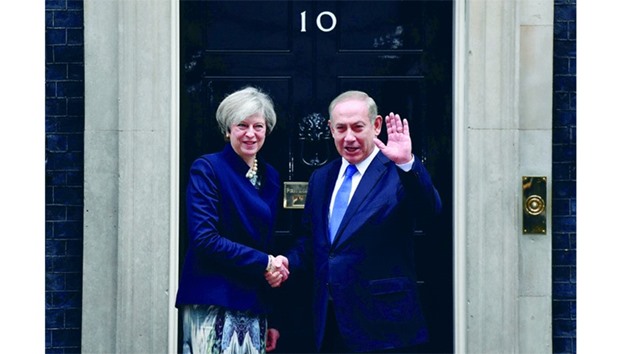Israeli Prime Minister Benjamin Netanyahu urged “responsible nations” to join new sanctions against Iran yesterday during a visit to London, but Britain defended a nuclear deal sealed between major powers and Tehran.
Ahead of his talks with British Prime Minister Theresa May, Netanyahu said other nations should follow new US President Donald Trump’s imposition of sanctions against Iran following a ballistic missile test.
“Iran seeks to annihilate Israel. It seeks to conquer the Middle East, it threatens Europe, it threatens the West, it threatens the world. And it offers provocation after provocation,” Netanyahu told May ahead of their meeting. “That’s why I welcome President Trump’s assistance of new sanctions against Iran. I think other nations should follow suit, certainly responsible nations.
I’d like to talk to you about how we can ensure that Iran’s aggression does not go unanswered.”
May’s spokeswoman said the British leader had repeated her backing for the nuclear deal with Tehran — which is strongly opposed by both Netanyahu and Trump — but said there was a need to “rigorously monitor” Iran’s behaviour.
“The prime minister made clear that we support the deal on nuclear that was agreed,” the spokeswoman told reporters, when asked whether Britain was considering joining new sanctions.
“What happens now is that (the nuclear deal) needs to be properly enforced, and we also need to be alert to Iran’s pattern of destabilising activity in the region.”
Earlier the spokeswoman said May would also tell Netanyahu that continued Israeli settlement activity in occupied lands captured in the 1967 Middle East War on which the Palestinians hope to create independent state undermined trust in the region.
Despite their differences, London has adopted a more positive approach to Israel since May became leader after last year’s vote to leave the European Union, echoing the more sympathetic tone set by Trump, with whom Britain wishes to secure a post-Brexit trade deal.
May told Netanyahu that Britain was a “strong and close friend of Israel”, and highlighted their co-operation in science, trade and security. They agreed to set up a working group to develop trade ties both before and after Brexit, the spokeswoman said.
Last month Britain said it had reservations about a French-organised Middle East peace conference in Paris and did not back the final communique by 70 countries which reaffirmed that only a two-state solution could resolve the Israeli-Palestinian conflict.
Its stance angered many EU members.
Kremlin says it disagrees with Trump’s view
The Kremlin said yesterday it did not agree with US President Donald Trump’s assessment of Iran as “the number one terrorist state” and wanted to deepen what it described as already good ties with Tehran.
The Kremlin was responding to comments Trump made to Fox News in an interview aired at the weekend in which he complained that Iran had “total disregard” for the United States.
Kremlin spokesman Dmitry Peskov said in a conference call with reporters that Moscow saw things differently. “Russia has friendly partner-like relations with Iran, we co-operate on a wide range of issues, value our trade ties, and hope to develop them further,” said Peskov. Trump and Putin say they want to try to rebuild US-Russia ties, that were badly damaged by Moscow’s 2014 annexation of Crimea and by Western sanctions imposed on Russia in response. Peskov said there was no reason for policy differences over Iran to hinder such a rapprochement. “It’s no secret for anyone that Moscow and Washington hold diametrically opposed views on many international issues,” said Peskov.” That should not be an obstacle when it comes to forging normal communication and pragmatic mutually-beneficial relations between Russia and the US.”

British Prime Minister Theresa May poses shaking hands with Israeli Prime Minister Benjamin Netanyahu after Netanyahu arrived for a meeting at 10 Downing Street in central London yesterday.
